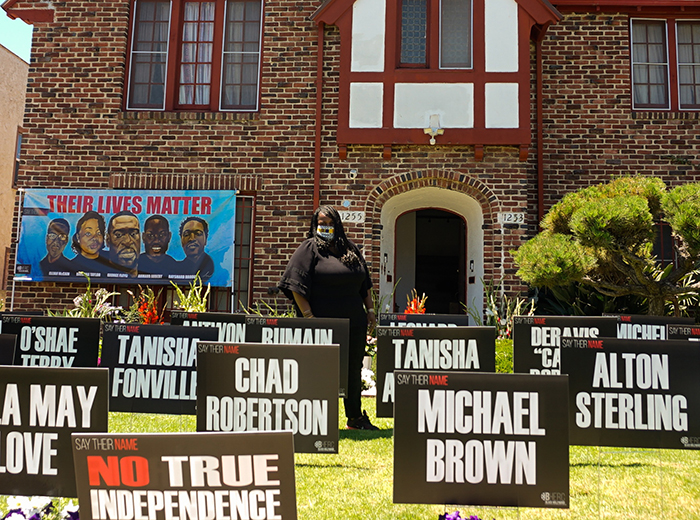Producer, activist will get to vote for 2021 Oscars
HOLLYWOOD — Sandra Evers-Manly, filmmaker and champion for Black Hollywood, had every reason to celebrate. On June 30, she was inducted into the Academy of Motion Picture Arts & Sciences, and will get to vote for the nominees and winners of future Academy Awards.
Yet Evers-Manly decided to sit out the Fourth of July, like many African Americans in the entertainment industry, due to civil injustices, including police brutality against the Black community, that have yet to be resolved in America.
This year, instead of the American flag, Evers-Manly’s front yard had a display of the names of police brutality victims on her front lawn with a sign that read “Their Lives Matter.”
“I don’t feel very celebratory,” Evers-Manly said. “The Fourth of July is Independence Day, but how independent is it? What freedoms do we have when we keep seeing Black people killed? For me right now, it’s not a day that I can celebrate.”
Within Hollywood, Evers-Manly is best known for writing and producing short films and documentaries, which include “21 and Done,” a documentary about young adults aging out of the foster care system and “The Peck Situation,” a short about a marriage in trouble. But it’s not only her presence in the entertainment industry that makes her a pillar of Los Angeles, but her activism and diligence in serving her community.
Evers-Manly is the cousin of assassinated civil rights activist Medgar Evers, who was murdered in 1963 in the driveway of his Mississippi home. Because of this, racial hatred and civil unrest is an issue that is very personal for Evers-Manly.
Her family’s history with the civil rights movement informed Evers-Manly’s work in promoting inclusion in Hollywood. After years of supporting other Black filmmakers, becoming a voting member of the Academy is a big step in ensuring that they are recognized at the Oscars, and are given more opportunities to make movies.
Evers-Manly said that she is honored and humbled to be in the Academy, but that this year comes with responsibility and greater accountability.
“We need to have more leadership when it comes to how Black images are represented in media,” she said. “We need justice and rights to ensure there’s diversity and inclusion.”
Diversity and inclusion goes beyond money. “First of all, people have to understand that change has to happen,” she added. “They will throw money and say let’s give to this or that. But what are the long-term changes in the organization? What processes are we going to have? [It’s about] creating the right culture and hiring at all levels of the organization to diversify your [employees].”
Over the course of her career, Evers-Manly has given back tremendously by awarding scholarships to those who later become part of Hollywood’s elite, like then-USC film student Ryan Coogler, who is best known for directing the Oscar-winning “Black Panther,” as well as “Creed” and “Fruitvale Station.” Through her nonprofit, the Black Hollywood Education and Resource Center, Evers-Manly has promoted the work of Black filmmakers and has given young people various opportunities to create films and excel in their craft.
BHERC also has a community initiative called Operation Love, which provides support and services to seniors, the homeless and those with underlying health conditions during the COVID-19 pandemic. Operation Love collected and donated supplies on July 4 in memory of police violence victims across the nation.
In November, California voters will have the opportunity to vote to reinstate affirmative action, in order to give more job and higher education opportunities to women and people of color. Evers-Manly is in support of this proposition and believes it is necessary to bring about the change needed in every industry, especially Hollywood.
“Hollywood has to hire more Black writers, showrunners and execs that can green-light film and television stories. Also, people of color who can make decisions,” she said. “So many stories are left at the table and they have been met with resistance. Some white decision makers will say things like, ‘We don’t think that will sell internationally and locally,’ meaning black people and people of color in general.”
Believing that can have a damaging impact on people, something that Evers-Manly wants to change.
“As a little girl, I used to ask my mom why no one looks and acts like me on TV, so I’ve made it my mission to ensure that image and depiction exists,” she said.
By Kayla Rodgers
Contributing Writer













